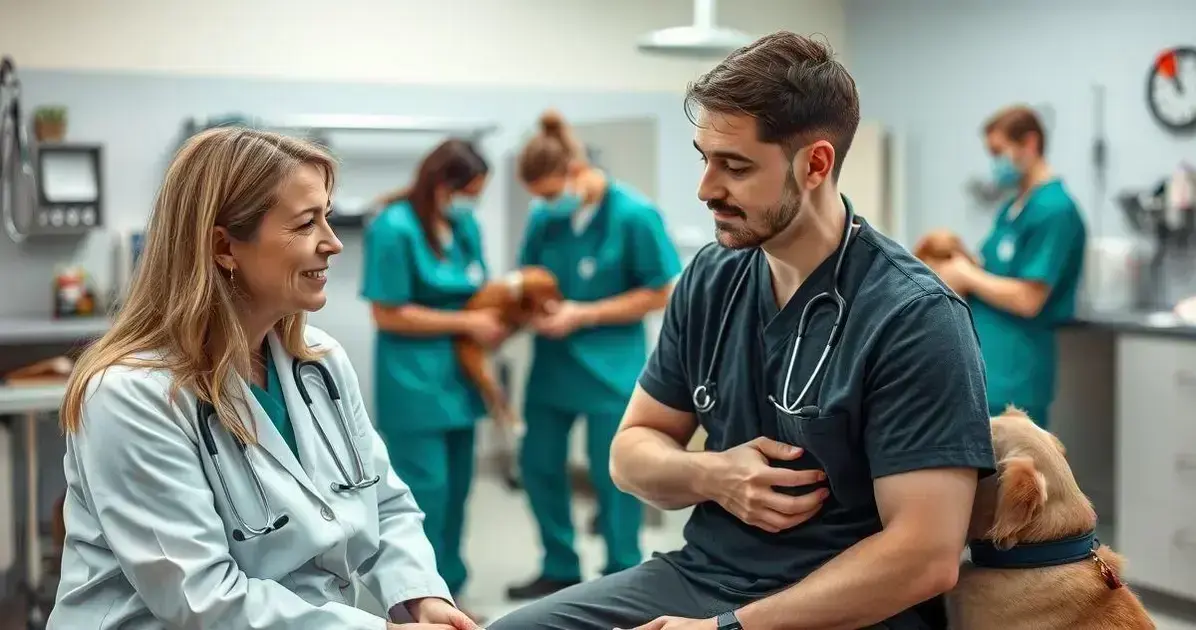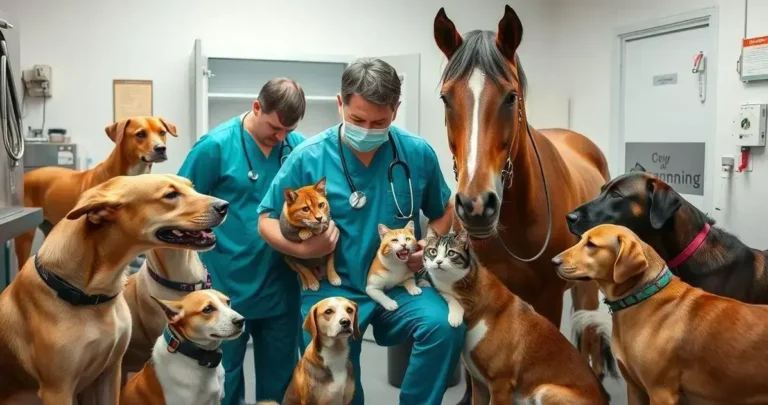Becoming a veterinarian requires mastering a variety of skills needed to be a veterinarian, ranging from medical knowledge to interpersonal qualities.
As you dive deeper into the field, it’s crucial to understand the educational requirements, essential soft skills, and the importance of staying updated with veterinary advances.
This article delves into the critical abilities that define a successful veterinary career.
Understanding Veterinary Medicine
Veterinary medicine is a branch of science focusing on the health and well-being of animals, encompassing both preventive care and the treatment of medical conditions.
Professionals in this field play a critical role not only in caring for pets but also in ensuring the safety of food sources and managing zoonotic diseases that can transfer from animals to humans.
At its core, understanding veterinary medicine requires knowledge of animal anatomy, physiology, and behavior. Veterinarians work with multiple species, including domestic pets, livestock, wildlife, and exotic animals, each presenting unique challenges and needs.
This diversity means that a veterinarian must have a broad skill set to assess and address the issues specific to each type of animal. Among the skills needed to be a veterinarian, adaptability, attention to detail, and strong communication are essential, especially when dealing with different animal temperaments and concerned pet owners.
Preventive care remains a cornerstone of veterinary practice. This includes regular health checkups, vaccinations, nutritional advice, and parasite control to maintain the overall health of animals and prevent diseases. Moreover, veterinarians are often tasked with educating pet owners and clients about the best practices for animal care.
Another key area is diagnostic work, which involves identifying diseases through tools such as X-rays, ultrasounds, and laboratory tests. These allow veterinarians to make informed decisions and formulate effective treatment plans.
Meanwhile, surgery is another aspect of the profession that requires precision, whether it’s routine procedures like spaying and neutering or more advanced operations.
The role of veterinarians often extends beyond clinics. Many work in public health, research, and education to improve our understanding of diseases and animal care. Whether managing epidemics among livestock or developing new treatment methods, they make significant contributions to both human and animal health.
Understanding the breadth of veterinary medicine allows aspiring veterinarians to appreciate the responsibility and dedication required in this rewarding field. Mastering the skills needed to be a veterinarian is not only vital for success but also fundamental to making a lasting impact on animal welfare and public health.
Key Educational Requirements
To become a veterinarian, aspiring professionals must follow a rigorous educational path, starting with a strong foundation in science.
Most veterinary programs require students to complete a bachelor’s degree before applying, with a focus on subjects such as biology, chemistry, physics, and mathematics. Courses in anatomy and physiology are particularly beneficial, as they provide critical insight into the complex systems of animals.
After undergraduate studies, candidates must attend an accredited veterinary school to earn their Doctor of Veterinary Medicine (DVM) degree. Veterinary programs typically span four years, combining both classroom learning and hands-on clinical experience.
The coursework is comprehensive, covering areas like animal pharmacology, pathology, microbiology, radiology, and surgical techniques. Clinical rotations are an integral part of the program, allowing students to apply their knowledge in real-world settings under the supervision of licensed professionals.
Admission to veterinary school is highly competitive, and candidates must often demonstrate a strong academic record, relevant volunteer or work experience, and skills needed to be a veterinarian, such as communication, empathy, and analytical thinking.
Prior experience through internships, part-time jobs, or volunteering at veterinary clinics or animal shelters can significantly strengthen an application by helping candidates develop some of the skills needed to be a veterinarian before entering the professional field.
Once the DVM degree is obtained, aspiring veterinarians must pass the North American Veterinary Licensing Examination (NAVLE) to be licensed to practice.
Some veterinarians choose to pursue post-graduate training through internships or residencies to specialize in fields such as surgery, internal medicine, or exotic animal care. This specialized training ensures they are equipped to handle more complex cases and provide advanced care.
Continuing education is also a key part of the profession, as veterinary medicine evolves with new research and technology.
Veterinarians are often required to update their knowledge and skills regularly by attending workshops, conferences, and additional courses to maintain their licensure and stay at the forefront of advancements in animal care.
Essential Soft Skills for Veterinarians

While technical expertise is vital for veterinarians, soft skills play an equally important role in ensuring success in the field. These interpersonal and emotional skills help veterinarians connect with pet owners, collaborate with colleagues, and handle challenging situations with empathy and professionalism.
One of the most essential soft skills for veterinarians is empathy. Veterinarians frequently interact with people who are concerned about their pets or livestock. Demonstrating compassion and understanding not only comforts clients but also builds trust and reinforces the veterinarian’s role as a caregiver.
Stress management is another critical skill, as veterinarians often face emotionally and physically demanding situations. Whether dealing with emergencies, delivering difficult news, or managing a busy practice, the ability to remain calm and focused is indispensable.
In addition, veterinarians must develop strong teamwork and collaboration abilities. Veterinary practices often operate as a team, involving technicians, assistants, and administrative staff. By fostering positive relationships and working cohesively, veterinarians can ensure the clinic runs smoothly and efficiently.
Adaptability is also vital, as no two days are the same in veterinary medicine. Veterinarians might need to shift from performing surgeries to consulting with clients or responding to unexpected emergencies. The ability to quickly adjust can help them navigate the unpredictable nature of the job.
Effective time management is essential, especially in a high-paced environment. Veterinarians must juggle multiple tasks, from diagnosing illnesses and performing procedures to handling administrative duties. Prioritizing tasks and using time wisely enables them to deliver the best possible care while maintaining productivity.
Lastly, developing high levels of emotional intelligence allows veterinarians to interpret both verbal and non-verbal cues from clients and colleagues. This helps them handle sensitive situations, provide reassurance, and make clients feel heard and valued.
Developing Hands-On Experience
Hands-on experience is a critical component of developing the skills needed to be a veterinarian. This practical exposure allows aspiring veterinarians to apply their theoretical knowledge in real-world scenarios and gain confidence in their abilities.
Early on, many students seek out volunteer opportunities at animal shelters, wildlife sanctuaries, or veterinary clinics to start building their experience.
Internships and externships play a significant role in providing structured, hands-on learning. These programs often place students in veterinary practices, zoos, or research facilities, where they can observe and assist licensed professionals.
Tasks might include aiding in physical examinations, observing surgeries, and learning proper handling techniques for various species. By taking on these responsibilities, aspiring veterinarians can become familiar with the day-to-day demands of the profession and start a foundation for developing the skills needed to be a veterinarian.
For those pursuing a veterinary degree, clinical rotations are an essential part of the curriculum. These rotations allow students to work directly with animals under the supervision of experienced veterinarians.
Rotations often cover a range of specialties, such as equine care, small animal practice, livestock medicine, or exotic animal handling, providing a well-rounded experience.
Gaining experience in diverse settings is particularly valuable, as it helps develop a deeper understanding of different species and their unique needs.
Working with livestock, for instance, requires knowledge of herd health management, while exotic animals often demand specialized care and handling techniques.
Mentorship opportunities can also enhance hands-on experience. Learning directly from established veterinarians gives aspiring professionals the chance to ask questions, receive guidance, and observe expert techniques.
Mentors can provide insights into diagnostic approaches, patient care strategies, and even business management for those considering opening their own practice.
Additionally, some aspiring veterinarians choose to participate in wildlife rehabilitation programs, offering them a chance to work with injured or orphaned animals. This experience can deepen their understanding of animal behavior and enrich their problem-solving skills.
Practice not only improves technical skills but also fosters confidence in handling delicate or challenging situations. Real-world experience is key in building the skills needed to be a veterinarian, from medical procedures to communication and adaptability in unpredictable environments.
Importance of Communication Skills
For veterinarians, effective communication skills are just as crucial as medical expertise. These skills enable them to build trust with pet owners, collaborate with colleagues, and convey information clearly and empathetically to clients.
Explaining complex medical details is a key aspect of communication for veterinarians. Pet owners often have limited medical knowledge, so veterinarians must translate technical terms into simple, clear language. Whether discussing a diagnosis, treatment plan, or preventive care measures, their ability to simplify concepts ensures that clients fully understand their options.
Strong listening skills are essential when interacting with clients. Veterinarians need to understand the concerns and observations shared by pet owners, as these details often play a critical role in diagnosing and treating animals. Active listening builds trust and makes pet owners feel heard and valued.
Among the many skills needed to be a veterinarian, communication and empathy stand out, especially when delivering sensitive or difficult news.
From explaining chronic conditions to discussing euthanasia, veterinarians often deal with emotionally charged situations. Compassionate communication helps pet owners navigate these moments with dignity and support.
Team communication is equally important in a veterinary practice. Veterinarians must collaborate effectively with veterinary technicians, assistants, and other staff to ensure the smooth operation of the clinic. Clear instructions, feedback, and cooperation among team members lead to better patient outcomes and a harmonious work environment.
Educating clients about preventive care, nutrition, and general animal health is another significant task that relies on communication skills. Veterinarians serve as advisors, guiding pet owners on how to provide the best possible care for their animals and emphasizing the importance of regular checkups and vaccinations.
Non-verbal communication also plays a role in interactions with both animals and humans. Calm body language, a reassuring tone of voice, and an approachable demeanor can ease nervous pets and help worried clients feel more comfortable during visits.
In addition to face-to-face interactions, veterinarians often communicate through written formats, such as medical reports, treatment instructions, or follow-up emails. Clear and concise writing ensures that information is easily understood and reduces the risk of errors in care.
FAQ – Frequently Asked Questions about Skills Needed to Be a Veterinarian
What educational qualifications are needed to become a veterinarian?
To become a veterinarian, you need a Doctor of Veterinary Medicine (DVM) degree, which typically requires completing a bachelor’s degree followed by four years of veterinary school.
Why are communication skills important for veterinarians?
Communication skills help veterinarians explain diagnoses, treatment plans, and preventive care to clients, as well as collaborate effectively with team members.
How can veterinarians gain hands-on experience?
Veterinarians can gain experience through internships, clinical rotations, and volunteer work at animal shelters, veterinary clinics, zoos, or wildlife rehabilitation programs.
What soft skills are crucial for veterinarians?
Critical soft skills include empathy, stress management, teamwork, adaptability, emotional intelligence, and effective time management.
How do veterinarians solve complex medical problems?
Veterinarians solve problems by combining diagnostic skills, critical thinking, and collaboration with colleagues to identify and address medical issues in animals.
Why is staying updated with veterinary advances important?
Staying updated ensures veterinarians provide the best care by incorporating new medical technologies, treatments, and techniques into their practice.


